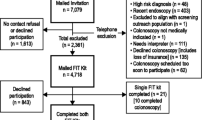Abstract
To determine the effect of a red-meat-free, high-fiber diet, patients performed fecal blood testing before colonoscopy for suspected polyps. One hundred twenty-nine patients were allowed an unrestricted diet, and 159 consumed the special diet. Without dietary restrictions, 31 of 77 patients with adenomas, five of eight with cancer, one of seven with nonneoplastic polyps, and one of 37 with normal colonoscopy had positive tests. With the special diet, 30 of 97 patients with adenomas, eight of ten with cancer, one of six with nonneoplastic polyps, and one of 46 with normal colonoscopy had positive tests. There are no statistical differences between the groups. Comparing all patients with cancer to those with normal colonoscopy, the sensitivity of fecal blood testing is 72%, the specificity 98%, and the positive and negative predictive value 87% and 94%, respectively. The sensitivity for fecal blood testing in patients with adenomas (compared to those with normal endoscopy) is 35%, the specificity is 98%, and the positive and negative predictive values are 97% and 42%, respectively. Combining all patients with adenomas, those with multiple polyps, larger polyps, or polyps located distal to the splenic flexure had positive fecal blood tests more frequently. Fecal blood testing does not detect a large number of colorectal adenomas. This study does not indicate any benefit on the sensitivity or specificity of fecal blood tests from the red-meat-free, high-fiber diet currently recommended.
Similar content being viewed by others
References
ACS report on the cancer-related checkup. Cancer 30:194–240, 1980
Hemoccult slide and tape product instructions. Sunnyvale, California, Smith Kline Diagnostics
Greegor DH: Diagnosis of large-bowel cancer in the asymptomatic patient. JAMA 201:943–945, 1967
Herzog P, Holtermuller KH, Preiss J, Fischer J, Ewe K, Schreiber HJ, Berres M: Fecal blood loss in patients with colonic polyps: A comparison of measurements with 51 chromium-labeled erythrocytes and with the hemoccult test. Gastroenterology 83:957–962, 1982
Crowley ML, Freeman LD, Mottel MD, Strong RM, Sweeney BF, Brower RA, Sharma SP, Anderson DS: Sensitivity of guaiac-impregnated cards for the detection of colorectal neoplasia. J Clin Gastroenterol 5:127–130, 1983
Leicester RJ, Lightfoot A, Millar J, Colin-Jones DG, Hunt RH: Accuracy and value of the hemoccult test in symptomatic patients. Br J Med 286:673–674, 1983
Macrae FA, St. John DJB: Relationship between patterns of bleeding and hemoccult sensitivity in patients with colorectal cancers or adenomas. Gastroenterology 82:891–898, 1982
Greegor DH: Occult blood testing for detection of asymptomatic colon cancer. Cancer 28:131–134, 1971
Winawer SJ, Andrews M, Flehinger B, Sherlock P, Schottenfeld D, Miller DG: Progress report on controlled trial of fecal occult blood testing for the detection of colorectal neoplasia. Cancer 45:2959–2964, 1980
Simon JB: Occult blood screening for colorectal carcinoma: A critical review. Gastroenterology 88:820–837, 1985
Author information
Authors and Affiliations
Rights and permissions
About this article
Cite this article
Norfleet, R.G. Effect of diet on fecal occult blood testing in patients with colorectal polyps. Digest Dis Sci 31, 498–501 (1986). https://doi.org/10.1007/BF01320314
Received:
Revised:
Accepted:
Issue Date:
DOI: https://doi.org/10.1007/BF01320314




